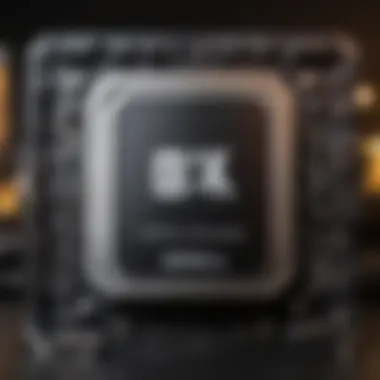The Ultimate Guide to Choosing Gaming CPUs


Intro
In the evolving landscape of video gaming, the importance of a powerful central processing unit (CPU) cannot be overstated. The CPU serves as the brain of the computer, managing tasks and executing commands that directly affect gaming performance. This article provides a thorough examination of the CPUs optimized for gaming, highlighting essential selection criteria, comparing leading models, and discussing future trends in technology.
As more gamers seek superior performance and immersive experiences, understanding how CPUs impact gameplay is crucial. This guide will help readers navigate the intricate world of CPU choices, ensuring they make informed decisions tailored to their gaming setups and preferences.
Games News
Latest Updates
The gaming industry is constantly evolving, with new titles and technologies making headlines. Keeping abreast of recent developments in CPU innovations can be equally crucial for gamers looking to upgrade their systems. Recently, AMD and Intel have both announced new processor lines aimed at providing higher frame rates and improved multitasking capabilities.
Breaking Stories
In recent months, major gaming hardware releases have altered the CPU landscape. The arrival of AMD's Ryzen 7000 series has been particularly noteworthy. Reviewers have praised these processors for their performance, particularly in multi-threaded scenarios, making them an attractive option for serious gamers.
Trending Topics
Current discussions among tech enthusiasts often center around the compatibility of next-gen consoles with high-end CPUs. Players debate the necessity of upgrading their CPUs to match the graphical capabilities of new game releases. Additionally, the potential impact of new GPU technologies on CPU performance remains a highly controversial topic.
CPU Selection Criteria
When choosing a CPU for gaming, several factors must be considered:
- Core Count: Modern games benefit from higher core counts as they can handle more simultaneous tasks.
- Clock Speed: The GHz rating reflects how quickly a CPU can process information. Higher clock speeds often translate to better performance in the gaming context.
- Thermal and Power Management: Understanding how a CPU manages power consumption and heat is vital for maintaining performance over time.
End
Understanding the Role of a CPU in Gaming
In the realm of gaming, the central processing unit (CPU) plays a fundamental role. It acts as the brain of your computer, processing instructions and managing tasks for various applications. It is crucial to grasp how CPUs function and their specific impacts on gaming performance to make informed choices when upgrading or building gaming rigs.
The CPU impacts every aspect of gaming. It handles calculations, manages communication between hardware, and executes the game code. Understanding these basic functionalities helps gamers appreciate the significance of selecting the right CPU. As games become more complex, the demand on CPUs increases, necessitating a balance between performance and budget.
Furthermore, decisions regarding the CPU can affect overall system functionality. A suboptimal CPU can bottleneck performance, leading to frustration during gameplay. Identifying how different CPUs perform in real-world scenarios is essential for achieving an optimal gaming experience. Thus, a strategic approach when investing in a CPU can drastically enhance gameplay and system responsiveness.
Basic Functions of a CPU
At its core, a CPU performs several essential functions. These include:
- Calculation and Execution: The CPU calculates all the physics, AI, and graphics data in a video game, translating them into actions on your screen.
- Data Management: It oversees memory and ensures data flows smoothly between the RAM and other components. This is vital in games that require quick responses and large amounts of data processing.
- Instruction Cycle: The CPU uses a repetitive cycle of fetching, decoding, executing, and writing back instructions. Each cycle influences game performance and speed.
Understanding these functions offers a clearer picture of what to prioritize in a CPU for gaming. Different gaming genres have different demands, thus influencing the choice of CPU.
Importance of CPU Performance
Performance in a CPU encompasses several aspects, such as clock speed, core count, and threading capabilities. Each of these factors directly influences gaming experience. Here are a few insights:
- Clock Speed: Measured in gigahertz (GHz), this indicates the speed at which a CPU can process instructions. Higher clock speeds translate to faster performance, particularly beneficial in fast-paced games like first-person shooters.
- Core Count and Threading: More cores mean a CPU can handle multiple tasks simultaneously. Games optimized for multi-core performance can greatly benefit from CPUs with higher core counts.
- Thermal Performance: Efficient thermal management ensures stability during long gaming sessions. CPUs that overheat may throttle performance, leading to inconsistent frame rates.
To summarize, CPU performance is not just about raw speed; it's about how well the CPU can handle a variety of tasks and its efficiency in doing so. Gamers must consider these parameters when selecting a CPU to ensure it aligns with their specific gaming requirements.
Key Specifications to Consider
Choosing the right CPU for gaming involves understanding several key specifications. Each specification plays a crucial role in determining overall performance. Essentially, a gamer must consider how these specifications interact with both the CPU and other components in their setup. Familiarity with these attributes can enhance gaming experiences significantly, making this knowledge essential for any serious gamer.


Clock Speed and Its Impact
Clock speed, measured in gigahertz (GHz), indicates how many cycles a CPU can perform per second. Higher clock speeds usually mean faster performance, which is particularly important in gaming. Most modern CPUs operate between 3.0 GHz and 5.0 GHz.
In gaming, clock speed can affect frame rates. When CPU speed is fast, tasks like computational calculations and physics simulations can run smoother, leading to better gameplay. However, it is not the only factor; thermal management and power consumption must also be considered. Optimal clock speed varies by game type.
It's essential to balance clock speed with other configurations for best overall performance.
Core Counts and Threading
Core counts determine how many simultaneous tasks a CPU can handle. A CPU with more cores can process multiple threads at once, which is beneficial for demanding gaming scenarios.
For instance, modern CPUs often feature 4 to 16 cores. An increase in cores improves multitasking and increases overall responsiveness. Threading technology, such as Intel's Hyper-Threading or AMD's Simultaneous Multithreading, allows each core to process two threads simultaneously. This capability can further enhance performance in CPU-intensive games, making core count and threading critical specifications for gamers.
Cache Memory Explained
Cache memory acts as a temporary storage area that allows the CPU to access frequently used data faster than retrieving it from the main memory (RAM). There are different levels of cache: L1, L2, and L3, each with increasing size and latency. Generally, larger cache memory contributes to improved efficiency by reducing the time the CPU spends waiting for data.
Understanding how much cache memory is available can help in gauging the CPU’s ability to quickly access data, which impacts gaming performance. Games with larger assets may benefit from a CPU with more cache, as it can store more data closer to the processor for quicker retrieval.
Thermal Design Power (TDP)
Thermal Design Power, or TDP, represents the maximum amount of heat a CPU generates under load. It is crucial because it affects cooling requirements and energy consumption. Typically measured in watts, a higher TDP means that the CPU requires better cooling solutions, which impacts overall system design.
Most gamers must be aware of TDP and ensure their cooling system can handle it. A CPU with a high TDP may perform optimally, but it can cause thermal throttling if cooling solutions are inadequate. This can ultimately affect in-game performance and stability.
In summary, understanding these specifications equips gamers to make informed decisions when selecting a CPU. Each characteristic plays a vital role in performance potential, allowing for tailored setups that meet specific gaming demands.
Popular Gaming CPUs on the Market
Understanding the current landscape of gaming CPUs is crucial for making informed decisions about computer components. These processors play a significant role in determining how well games run, affecting both performance and experience. The selection of a gaming CPU can dictate overall frame rates, resolution capacity, and multitasking effectiveness in demanding gaming environments. As such, being aware of popular choices helps gamers balance their budgets with the performance they desire.
Intel's CPU Offerings
Intel has long been a dominant player in the CPU market, particularly for gaming. Its offerings are designed to cater to various needs, providing different tiers of performance and budget options. Each series holds distinct characteristics that make them appealing for specific gaming applications.
Core i9 Series
The Intel Core i9 series is positioned as the premium option for high-end gaming. It features a high number of cores and hyper-threading capabilities, allowing for seamless multitasking. The key characteristic of this series is its impressive clock speeds, often reaching into high GHz ranges. This means better performance in CPU-intensive tasks such as gaming and content creation.
One unique feature of the i9 series is the inclusion of Intel's Turbo Boost Technology, which automatically increases the processor's speed during demanding tasks. While the advantages include top-tier performance and responsiveness, the disadvantages could be its higher price compared to other CPUs. Therefore, this series may appeal mostly to professionals and serious gamers who require uncompromised performance.
Core i7 Series
Next in line is the Core i7 series, suitable for gamers who need robust performance without breaking the bank. This series still offers an excellent balance between price and power. The key characteristic here is the combination of a high core count and strong clock speeds, providing substantial power for most gaming experiences.
One intriguing aspect of the i7 series is its effective handling of multi-threaded applications. This makes it a beneficial choice for gamers who also engage in streaming or content creation alongside gameplay. Yet, compared to the i9 series, users might notice slightly lower performance in extreme multitasking scenarios, making it essential to consider specific gaming needs.
Core i5 Series
For budget-conscious gamers, Intel's Core i5 series presents affordable but capable options. With a moderate core count and moderate clock speeds, this series manages gaming performance adequately for most titles. The key characteristic of this series is its efficiency in both gaming and everyday tasks, making it versatile.
A unique feature of the i5 series is its ability to provide decent performance while consuming less power than its higher-end counterparts. This can result in lower thermal generation, which is beneficial for compact builds. The advantages include affordability and sufficient performance for casual gaming. However, the disadvantages may involve a struggle with more demanding games or future-proofing capabilities compared to the more powerful Core i7 or i9 offerings.
AMD's CPU Lineup


AMD has gained traction in the gaming CPU market, offering strong alternatives that often challenge Intel's dominance. The Ryzen series has become synonymous with high value and performance, making it a preferred choice for many gamers.
Ryzen Series
The Ryzen 9 series represents AMD's high-performance offering, similar to Intel's i9 series. Its architecture allows for excellent multitasking and gaming capabilities. The key characteristic of Ryzen 9 CPUs is their high core and thread counts, which excel in multi-threaded performance. This series is particularly suitable for gamers who also wish to engage in streaming or heavy production workloads.
A standout feature is the advanced 7nm process technology, providing a significant performance increase while also improving energy efficiency. The advantages include high frame rates in most games and superior handling of background tasks. However, they often come at a higher price point, making it a considerable investment.
Ryzen Series
AMD's Ryzen 7 series stands out for offering a balanced performance for both gaming and productivity. It is designed for serious gamers who want power without stepping up to the highest price brackets. The key characteristic lies in its balance of price and performance, providing substantial gaming capabilities.
One significant feature is the combination of high core count and support for PCIe 4.0, which allows for faster graphics cards and storage solutions. The performance in gaming is impressive, allowing Ryzen 7 to compete with Intel's i7 offerings. The advantages are diverse gaming performance and strong multitasking ability. The potential disadvantages could include slightly lower single-threaded performance in specific scenarios when compared with Intel CPUs.
Ryzen Series
For budget gamers, the Ryzen 5 series offers an appealing solution by merging affordability with fulfilling performance. A considerable key characteristic is its ability to run most modern games effectively while maintaining cost-efficiency. This makes Ryzen 5 a popular choice among those who play less demanding titles or prefer not to invest heavily in hardware.
Notably, many Ryzen 5 CPUs utilize AMD's Zen architecture, which enhances their performance in multi-threaded scenarios. This leads to advantages in efficiency and value. However, the disadvantages can manifest as challenges in demanding games or future-proofing dilemmas compared to higher series.
Comparative Analysis of Intel vs AMD
When comparing Intel and AMD CPUs, it's clear that the choice largely depends on user priorities. Intel often leads in single-core performance, making its CPUs slightly better for latency-sensitive tasks. AMD, on the other hand, shines with its multi-threaded capabilities, offering more cores at competitive price points.
Price-to-Performance Ratio
The price-to-performance ratio is a critical metric for gamers when selecting a CPU. This term refers to the balance between the cost of a CPU and the performance it delivers. In gaming, where high frame rates and quick response times are essential, understanding this ratio helps consumers make informed decisions that align both with their performance needs and budget constraints.
A favorable price-to-performance ratio implies that for every dollar spent, the CPU delivers optimal processing capability. This consideration is particularly significant in a market where new models are consistently introduced, often at premium prices. Gamers want to ensure that they are not overspending on features that may not enhance their gaming experience. Therefore, evaluating the price-to-performance ratio allows for a critical comparison between different CPUs and their capabilities, ensuring that gamers receive satisfactory performance without financial strain.
Budget CPUs for Gaming
Many gamers begin their journey with a limited budget. In this context, budget CPUs serve as an entry point into gaming with decent performance. Examples of budget CPUs include models from the AMD Ryzen 5 series and Intel's Core i3 series. These processors offer respectable gaming performance while remaining affordable.
When considering budget options, gamers should be aware of their limitations. Budget CPUs may struggle with more demanding games or multitasking scenarios. However, they still provide a solid gaming experience for less resource-intensive titles. Choosing a budget CPU can allow users to spend funds on other vital components, like graphics cards or memory.
Mid-Range Options
Mid-range CPUs often strike the ideal balance between performance and price. Gamers looking to enhance their experience without breaking the bank can find excellent options in the AMD Ryzen 7 series or Intel's Core i5 lineup.
These CPUs support higher core counts and improved clock speeds, which contribute to better performance in multi-threaded tasks. In gaming, this results in smoother frame rates and reduced latency during competitive play. When purchasing a mid-range CPU, gamers should consider how it complements their overall system and gaming preferences. Moreover, investing in a mid-range option generally ensures longevity for upcoming gaming titles, as these processors are more adept at handling future demands.
High-End Choices
For those seeking the pinnacle of gaming performance, high-end CPUs are available to satisfy even the most demanding gamers. The Intel Core i9 series, along with AMD's Ryzen 9 series, represents the top tier in processing power.
These CPUs feature high clock speeds, numerous cores, and large cache sizes, making them ideal for intense gaming sessions and streaming. Though these models come with a higher price tag, the performance is unmatched. They are perfect for gamers who require exceptional performance, especially in resource-heavy games or while running multiple applications simultaneously. Adopting a high-end CPU can significantly enhance your overall gaming experience but requires careful consideration of the entire build to ensure compatibility and optimal performance.
"Choosing the right CPU can influence the overall gaming experience. It’s not just about playing games; it’s about enjoying them.”
CPUs for Different Gaming Genres
When selecting a CPU for gaming, understanding the different genres is essential. Each genre demands distinct performance characteristics from a central processing unit. Not only do processors handle game logic and physics, but they also play a crucial role in how smoothly games run. This section explores how CPUs influence various gaming genres and guides gamers in choosing the right CPU based on their gameplay preferences.
First-Person Shooters


First-person shooter games are intense and fast-paced. They require quick reflexes and real-time processing of input data. A powerful CPU ensures a high frame rate, which is vital for a seamless gaming experience. Many modern shooters are highly graphical and complex, placing a significant load on the processor. Games like Call of Duty or Counter-Strike demonstrate that high single-thread performance is crucial. CPUs with higher clock speeds and fewer cores can often achieve better results in these scenarios. Therefore, gamers looking to dominate in FPS must consider investing in CPUs that excel in single-core performance.
Real-Time Strategy Games
Real-time strategy games, such as Starcraft or Age of Empires, present a different challenge. These games often involve numerous units on the screen at once, requiring robust multitasking capabilities. A CPU with a higher core count can manage parallel processing tasks more effectively, ensuring smooth gameplay even in the most chaotic scenarios. Since players have to track multiple units and handle complex calculations, having a CPU that can efficiently allocate resources is a critical factor when selecting a processor for this type of gaming.
Role-Playing Games
Role-playing games, or RPGs, tend to be more immersive and detail-oriented. Titles like The Witcher and Final Fantasy offer expansive worlds with rich narratives. Here, CPU performance is essential but in a different way. While high clock speeds help with loading times, larger caches improve memory access speeds for better overall performance. Additionally, modern RPGs utilize AI for diverse NPC behaviors, requiring processors adept at handling complex calculations. A balanced CPU with a good mix of clock speed and core count provides the best experience for players diving deep into compelling stories, quests, and cooperative gameplay.
Key Takeaway: Selecting the right CPU can significantly affect the gaming experience across genres. Whether looking for high frame rates in FPS games, multitasking in strategy games, or processing complex narratives in RPGs, understanding specific demands is crucial.
Future Trends in CPU Technology
The landscape of CPU technology is constantly evolving. Understanding future trends is crucial for gamers who wish to stay ahead of the curve. These advancements offer exciting opportunities for enhancing gaming performance and overall experiences.
Advancements in Multi-Core Processing
Multi-core processors have become more prominent in recent years. This trend is important because gaming software increasingly takes advantage of multiple cores. As game developers create more complex environments and AI routines, CPUs with higher core counts can manage these tasks more efficiently.
- Scalability: More cores allow for better scalability in processing power. Games utilizing multiple cores can see improved frame rates and smoother gameplay.
- Parallel Processing: With advancements, CPUs will handle parallel processes effectively. This means actions like rendering graphics and running in-game physics simultaneously will see less impact on performance.
Overall, the future of gaming CPUs points to an increase in core counts, optimizing the gaming experience for users.
The Role of AI in CPU Development
Artificial Intelligence is significantly shaping CPU design and functionalities. AI can streamline processes in several ways.
- Dynamic Resource Management: AI-driven CPUs can allocate resources dynamically based on demand. This allows for better performance in gaming scenarios.
- Predictive Analysis: CPUs employing AI can analyze user patterns. They adapt resource utilization according to common gaming behaviors, ensuring efficiency in gameplay and resource consumption.
Incorporating AI in CPUs illustrates a shift towards smarter hardware. This enables systems to operate more efficiently while handling complex gaming tasks.
Impact of Emerging Technologies
Emerging technologies will significantly influence the CPU market. Keeping an eye on these developments is vital for future-proofing gaming setups.
- Quantum Computing: Though still in its infancy, quantum computing could revolutionize how CPUs process information. While not widely applicable yet, the potential for massive speed increases exists.
- Integrated Graphics Processing Units (GPUs): The blending of CPUs and GPUs into single chips may continue to rise, making it feasible for compact gaming devices without sacrificing performance.
Understanding these emerging technologies can equip gamers with insights into what may become mainstream. Keeping informed about these trends allows for more informed choices about future gaming setups.
Culmination and Recommendations
The conclusion of this guide is essential as it not only summarizes key insights but also offers tailored advice for gamers. Understanding the significance of the right central processing unit (CPU) is vital in maximizing gaming performance. A suitable CPU can influence frame rates, load times, and overall gaming experiences.
Through careful consideration of specifications, price-performance ratio, and gaming genres, players can make informed decisions that will enhance their setup. Moreover, as technology evolves, staying updated with trends ensures gamers can maintain a competitive edge.
Summary of Key Insights
In this guide, several critical points regarding CPUs have been discussed. Here are the main takeaways:
- The CPU's performance directly affects gaming experiences, influencing speed and multi-tasking capabilities.
- Specifications such as clock speed, core count, and cache memory are crucial in selecting a suitable CPU.
- Both Intel and AMD offer strong options, catering to different budgets and performance needs.
- Understanding the specific requirements for various gaming genres helps refine CPU choices.
- Future trends highlight advancements in technology that can further optimize gaming performance, such as multi-core processing and AI integration.
Final Recommendations for Gamers
When selecting a CPU, consider the following recommendations for optimal performance:
- Assess Your Gaming Needs: Choose a CPU based on the games you mostly play. If you prefer resource-intensive titles, prioritize higher core counts and clock speeds.
- Budget Wisely: Identify a price bracket that suits you. Budget CPUs can still offer decent performance, while investing in high-end models may better support future games.
- Keep Up with Trends: Pay attention to new CPU releases and innovations in technology. Staying informed can ensure your rig remains relevant.
- Compatibility Checks: Ensure the CPU is compatible with your motherboard and other components. This avoids potential upgrades and ensures a smooth gaming experience.
Remember, the right CPU can greatly enhance your gaming setup, ensuring not only a better performance but also a richer overall experience.
By synthesizing the information from this guide, gamers can strategically choose CPUs that align with their preferences and future-proof their setups.



